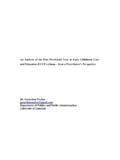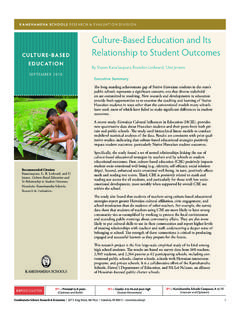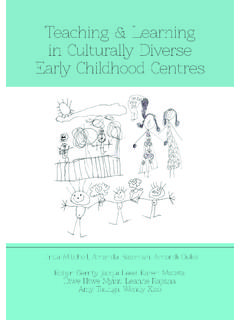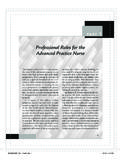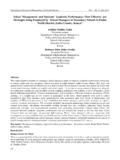Transcription of COMMUNITY EDUCATION & SOCIAL CHANGE
1 qualitative research exploring the current nature of COMMUNITY EDUCATION in DonegalCOMMUNITY EDUCATION & SOCIAL CHANGET able of figures4 Abbreviations4 Foreword5 Structure of the report7 Executive Summary81. COMMUNITY EDUCATION in Donegal research Methodology142. Defining COMMUNITY EDUCATION :16 setting the A pedagogy for COMMUNITY Characteristics of the COMMUNITY 18education How does this model translate 19in the learning setting? Exclusion and COMMUNITY EDUCATION Learner Policy Framework For COMMUNITY 26 EDUCATION In Funding sources for COMMUNITY Broader policy developments284. Sociol Economic Profile Of Donegal 305. Analysis of data from a survey 34of COMMUNITY EDUCATION Group Participation trends in COMMUNITY Individual, collective and 36political outcomes Programme Factors that influence the type of 43programmes Who participates in COMMUNITY 45education?
2 Challenges in targeting participants Key barriers to delivering 49community Accreditation Issues50 Adult Funding and COMMUNITY EDUCATION Providers: 56 Unlocking The Responding to the most vulnerable A SOCIAL programme or SOCIAL CHANGE ? From the personal to the political The power of the collective Structural COMMUNITY EDUCATION fro men? Accreditation and COMMUNITY EDUCATION Participants: 73 Realising The The How people are getting COMMUNITY EDUCATION approaches Impact of COMMUNITY Accreditation and Male Barriers to participation in 84community Conclusion858. Summary Analysis Of COMMUNITY 87 EDUCATION Provision In Co. COMMUNITY EDUCATION is rooted 87in a process of SOCIAL COMMUNITY EDUCATION is 90 in and of the COMMUNITY Responding to educational 91and structural Taking part in decision making and 92policy formation within community9.
3 Implications for the Promotion of COMMUNITY EDUCATION 94methodologies in COMMUNITY based Funding for COMMUNITY EDUCATION Childcare and SOCIAL Inclusion of men in COMMUNITY Greater collaboration in the 99community EDUCATION sector10 A COMMUNITY EDUCATION model 100for SOCIAL changeBibliography103 Appendix 1: 105 research objectives as outlined in the terms of referenceAppendix 2: 107 Copy of COMMUNITY EDUCATION surveyAppendix 2: 116 Equality Framework for COMMUNITY educationAppendix 3: 117 Issues identified by providers as barriers to COMMUNITY educationAppendix 4: 120 Courses that participants (in focus groups) had undertakenTable of Contents34 COMMUNITY EDUCATION and SOCIAL CHANGE Figure 1: 34 Persons aged 15 and over in Donegal whose full time EDUCATION has ceasedFigure 2: 36 Type of groups who took part in the survey Figure 3: 37 Number of participants accounted for in the sampleFigure 4:38 Framework of proposed outcomes for COMMUNITY EDUCATION in DonegalFigure 5: 43 Types of programmes being delivered by COMMUNITY groups in the sampleFigure 6: 45 Range of COMMUNITY EDUCATION programmes in the sampleFigure 7: 48 Groups targeted by COMMUNITY EDUCATION providersFigure 8: 49 Groups identified as hard to engage in COMMUNITY educationFigure 9: 50 Methods used to recruit participants to COMMUNITY EDUCATION in DonegalFigure 10: 51 Ranking allocated to issues that inhibit therecruitment of participantsFigure 11.
4 52 Barriers in delivering COMMUNITY educationFigure 12: 54 Levels of accreditation offered by groups in the sampleFigure 13: 55 Range of accreditation offered on communityeducation coursesFigure 14: 56 Methods used for recruiting tutorsFigure 15: 57 Funding sources for COMMUNITY EDUCATION in DonegalFigure 16: 58 Range of activities that funding coversTable of FiguresAbbreviationsAONTASThe National Adult Learning OrganisationBTEIBack to EDUCATION InitiativeCDPC ommunity Development ProjectEEIE ducational Equality InitiativeFETACF urther EDUCATION Training Award CertificateFRCF amily Resource CentreHETACH igher EDUCATION Training Award CertificateHSEH ealth Service ExecutiveLDSIPL ocal Development SOCIAL Inclusion ProgrammeNDPN ational Development PlanNQAIN ational Qualifications Authority of IrelandVTOSV ocational Training Opportunities SchemeVECV ocational EDUCATION CommitteeDoor to door with COMMUNITY EDUCATION inDonegal!
5 One can hear in this report fromthe Donegal COMMUNITY EDUCATION Forumthe individual invitations to all members of local communities to come along to something interesting in their local COMMUNITY EDUCATION centre. One can hear the voices of learners as they expressconfidence and excitement about new learning. People also become less isolatedand begin the journey of becoming activemembers of their often reports want to emphasise theways in which a county, or programme, or problems differ from one place to another, even joining in a sort of competitionfor most disadvantaged status. This is notthe way with this report. But Donegal is different. It does have higher rates of unemployment, historically fewer adults with Leaving Certificate, lower levels ofinvolvement in higher EDUCATION and a very high percentage of the population living in rural areas.
6 Donegal communityeducation does not dwell on these but presents a self-image as a thriving venture. But Donegal is unique in other very important ways. There are COMMUNITY EDUCATION programmes that go door todoor as a way of addressing the hesitationof so many to come along and join an interesting learning journey. A number ofprogrammes set out to address issues ofsocial exclusion and bring about socialchange. These are welcome differences and they contribute in no small way to the unique and successful programmesoffered throughout this large the country so many of those whomost need COMMUNITY EDUCATION are theslowest to come into programmes but this is met by the willingness of proactive educatorsto connect with local communities and ease the difficult experience of joining a programmes in other places will look at this experience and will have thecourage to also declare that in these cases, advertising is not very effective.
7 This neighbourhood work is not the onlyinteresting way of engaging adults inDonegal. The providers and tutors are decidedly on the side of the disadvantagedin their communities to such an extent thatsome of the programmes have a clear socialjustice focus and a SOCIAL CHANGE emphasis on Freire and his pedagogyand methodology is clear and well understood. Though students may not be as committed to this agenda, the providersare rightly determined to offer to studentsthe full range of learning in which it is possible for adults to engage. This acknowledges that for adults the possibilitiesopen to them range far beyond what theymight seek on first enrolling. We can onlyknow what we want when we know whatwe can have. It is an important aspect of learning to come to know what learning is possible.
8 Then adults can decide what they want to learn. Foreword5 COMMUNITY EDUCATION and SOCIAL CHANGE 6 COMMUNITY EDUCATION and SOCIAL CHANGE The programmes in this report are impressive because they set out to deal with disadvantage. COMMUNITY educationempowers and builds the confidence of local communities to engage in developingresponses to educational and structural disadvantage and to take part in decisionmaking and policy formation within thecommunity. This impressive vision of whatcommunity EDUCATION can do is the drivingforce behind the Donegal programmes. The emphasis is on participation andempowerment so that a collective voice can be forceful in making systems and individuals address poverty and other exclusions. Though not all programmes areas clearly focussed on SOCIAL CHANGE , thisethos is boldly offered to the adult students.
9 COMMUNITY EDUCATION builds respect, supportsactive citizenship and teaches , prejudice, sectarian conflict andother activities including violence are anti-democracy. The future is bright for thecommunity EDUCATION projects in Donegalbecause it offers the essential confidencebuilding but always goes beyond to offer astrong SOCIAL activist and SOCIAL CHANGE versionof COMMUNITY EDUCATION . Their claim to befollowers of Freire is modest. Their ambitionand practice is about supporting real changein the lives and communities of report does not shy away from the obvious problems in the COMMUNITY EDUCATION sector. If these include childcare,transport and progression among others thereport is clear but not looking at these asinsurmountable barriers but opportunities togather one s strength and continue to pushthe system into addressing them.
10 Men, asusual are particularly difficult to engage. It it clear that this sector finds funding wherever it can, from many governmentdepartment, North/South bodies, SVP, WEA,IFI. Peace II and the VEC. Far too much energy is expended by local communitybased organisations and programmes chasing the fragmented, disconnected andfar too modest funding streams. The learningis so important, the students voice so convincing, the outcomes so vital and lifeenhancing that the government would do agreat service to these communities if theycould place funding on a sound footing andeliminate the need to attract funding fromall points of the compass. Short-term fundingis not a sustainable way of addressing disadvantage. It does not address the factthat disadvantage is cannot be eliminated by programmes that are funded for short durations.
